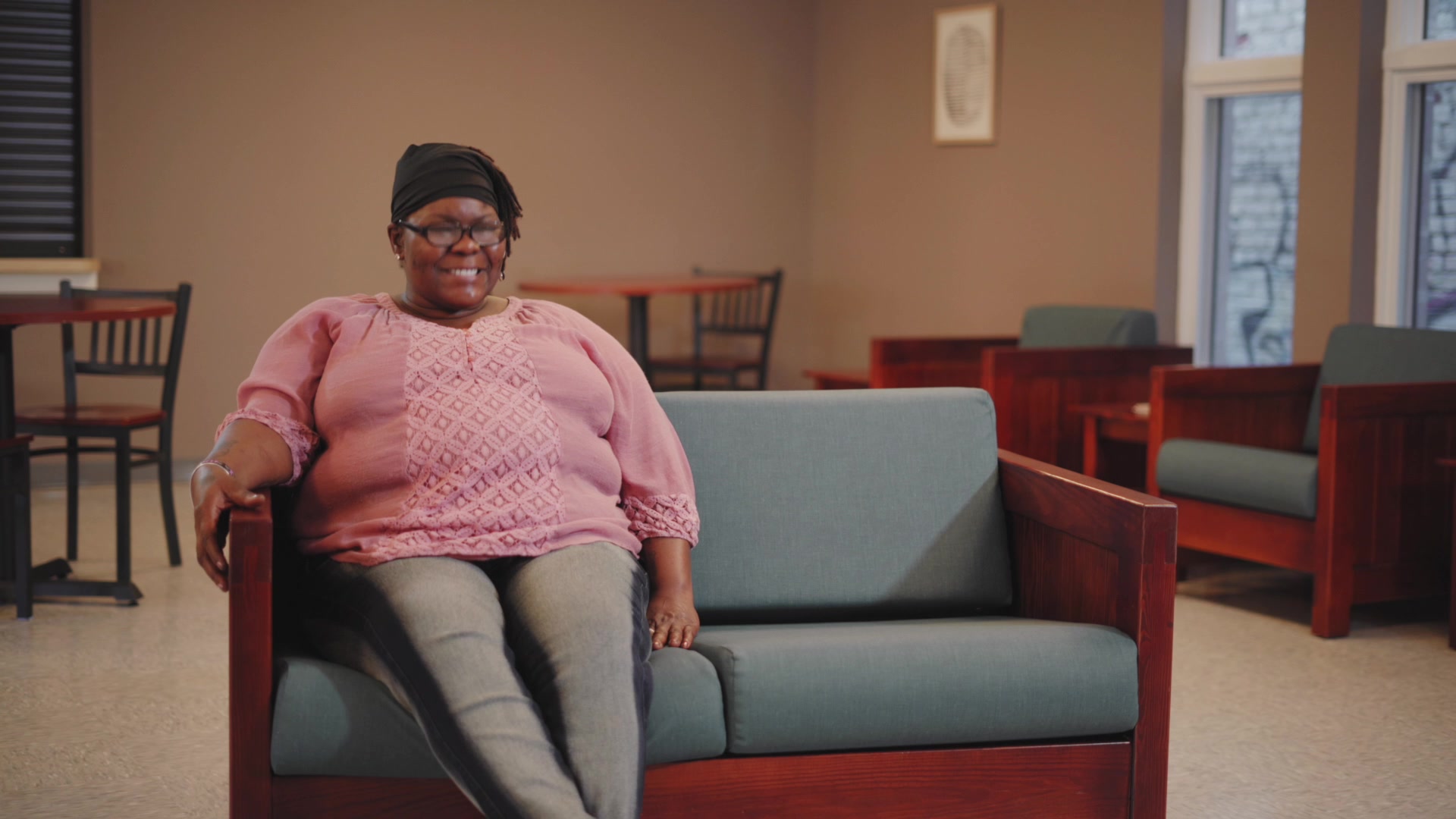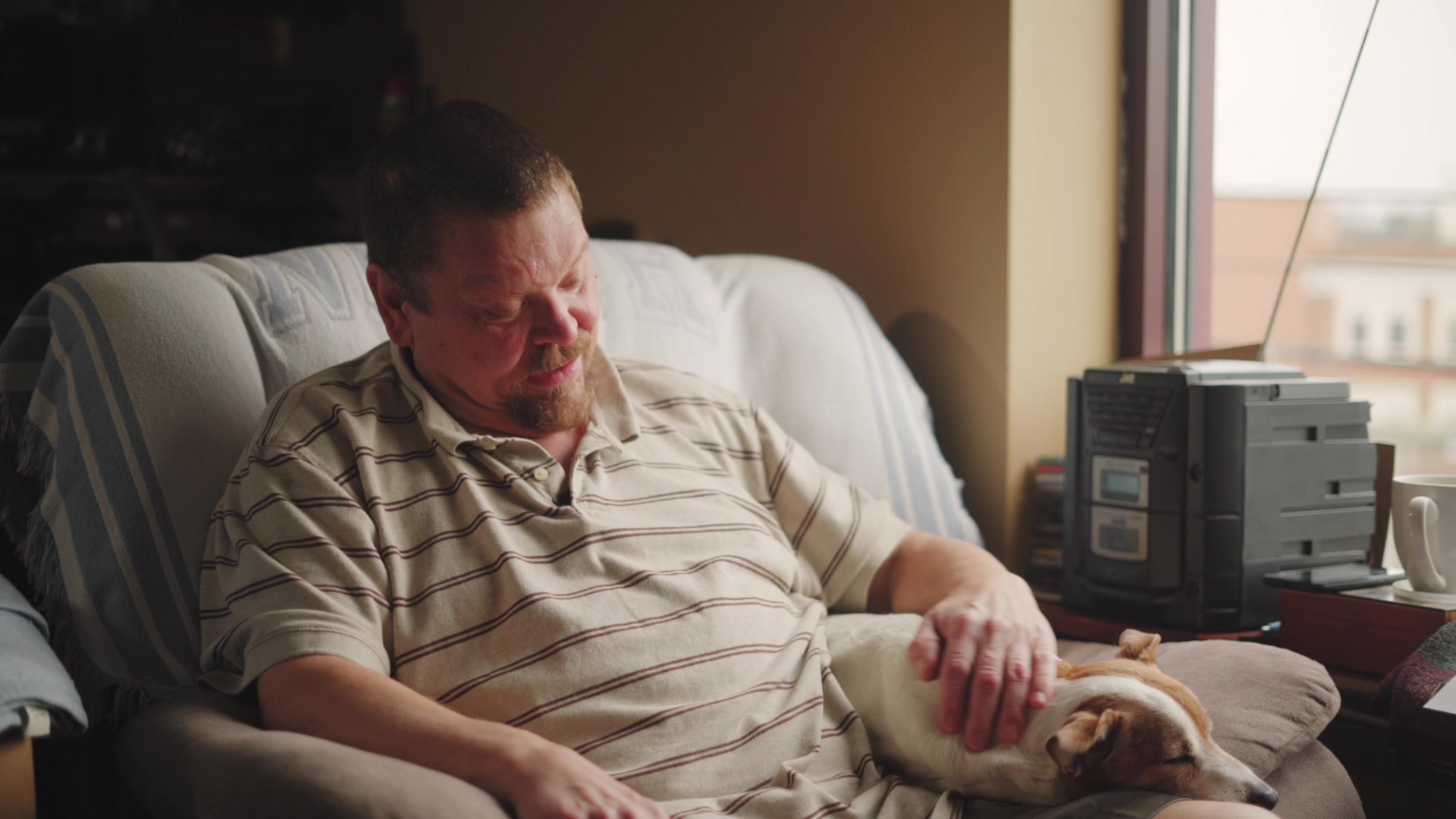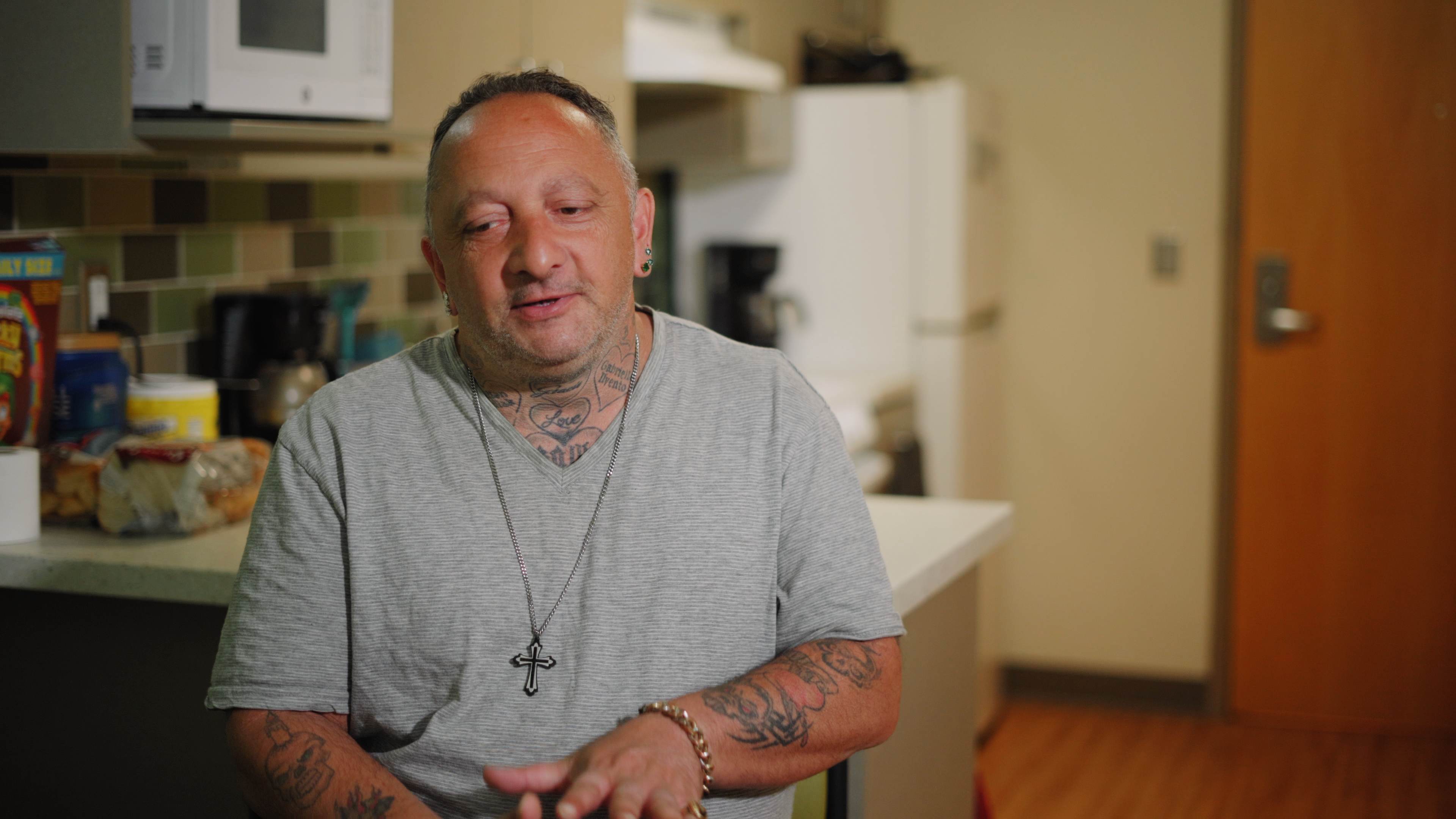Stories of Hope
Muhammad

Before experiencing homelessness, Muhammad was a true American success story. An Iraqi immigrant, he worked for the US Army, made a six figure income, and was happily married with two kids and a beautiful home in Virginia.
But while deployed, he was injured. When he came home, his disability and PTSD began affecting his life and relationships. His marriage fell apart, and he lost his home and investments. In January 2015, he moved into his car, where he lived for the next eight years.
Living in his car was incredibly difficult. The Walmart parking lot was one of the few places he could park overnight. He sometimes slept on the street just to be able to stretch his legs out fully. With few services available in the city, he relied on the Haven shelter for breakfast and showers. To earn money, he would drive for Uber and Lyft, often driving all the way to Richmond to pick up passengers from the airport, where the money was better than in Charlottesville. His health deteriorated. He missed doctor’s appointments and was unable to stay on top of his medications. His diet depended on fast food, causing him to gain weight. The years of cramped sleep caused permanent damage to his body. “I lost my dignity in that time,” he says.
The challenges and roadblocks of bureaucracy also thwarted his housing search. He reached the front of the line for a spot at the Crossings in May 2022, but lost out when his street homelessness made him difficult to get in contact with. He was awarded a Housing Choice Voucher, but an eviction on his record made him ineligible for many units. He would try to research apartments on his own, searching on his phone or at Panera on his laptop when he could afford to buy something. But apartment application fees piled up and made the process too expensive to continue.
He eventually connected with a few agencies to work on securing housing. Through combined efforts and advocacy from case workers at the Jefferson Area Board for Aging and the Albemarle County Office of Housing, he was finally given an apartment in the Crossings in January 2023.
After so many years on the street, Muhammad is still adjusting to his new life. “I’ll drive back to the places I used to sleep. Sometimes I forget I have somewhere to come home to. Sometimes I can’t believe it.” For him, it’s a second layer of PTSD he’s working through. He’ll see people experiencing homelessness – especially those on the street – and cry, remembering his own experience. “I’m lucky I have a car,” he says. “I help neighbors as much as I can. Especially when I have gas.” And now that he’s housed, he’s working to get his health back on track. “I have been able to make food, good meals. Iraqi food, American food – healthy food.”
And for the first time in a long time, he’s looking forward to the future. “Every day I have hope – that’s the best part.”
Curtis

“I’m a person that worked real hard and worked all my life. I used to feed the homeless and everything. And then one day, I looked up and I was there… It was really hard to see myself like that.” Mr. Moore recalled when talking about his story.
Mr. Moore is a man that always worked hard for the things he had and for the people around him. In 1991, while living in Baltimore, Mr. Moore was shot in the neck while saving five people’s lives. This left him partially paralyzed and with Brown-Sequard Syndrome. This disability changed his life. It took a year of therapy until he could walk again. He went from playing sports and travelling regularly to a much slower lifestyle. Eventually, Mr. Moore found himself in the same situation of those he used to help – Homeless.
He tried to stay with family, but found this extremely difficult because of his disability. He spoke of this hard period saying, “Everywhere I was going it wasn’t really suitable for my handicap. The bathroom would be upstairs and I couldn’t make it upstairs.” He spent most of his 3 years of homelessness living in his car. People would encourage him to go to shelters but he refused to go because he didn’t want to take up space that was someone else’s and most were not suitable for his handicap.
After 3 years of homelessness, Mr. Moore got connected with VSH through social services. “I thank God for helping me meet and talk to the right people.”, he said. “Now I’m here. I love it. The people are beautiful. I’ve been here almost 4 years but it really doesn’t feel like it… Everybody is nice in this building and looks out for me. The atmosphere around here is real good for me. From the workers to the people that live here. And it’s handicap accessible!” Mr. Moore has started traveling again and hopes to take a trip to Atlantic City soon. But one of his favorite things to do now that he has a home, is to cook. His grandmother was a great cook and taught him when he would visit for the summers as a boy in North Carolina. Cooking sounds so basic. For a person who was homeless and living in his car for three years – it is freedom, hope and dignity.
Joel

Very few people understand the power of grace to change someone’s life like Joel Chambers. Both grace from those around you and “God’s grace in saving and changing lives.”
Before he experienced homelessness, Joel had a relatively typical life. He’d been involved in the criminal justice system as a young man, but was working hard to reintegrate back into society after some time in prison. He was married, had a job at an Apple Genius Bar, and was in college full-time getting his degree in software development. “Life was good,” he said.
One day in 2016, he woke up unable to walk. He was soon diagnosed with multiple sclerosis. He spent months in in-patient care and was told he may never walk again.
As Joel processed his life-changing diagnosis, its impact rippled across his life and relationships. He was unable to work, with only his disability benefits to fill the gap. He began self-medicating with alcohol. And his personal relationships felt the strain. “With all the attention on my MS, my wife was sidelined. By me, by our friends. Our marriage fell apart.” In March 2018, he was evicted from his apartment on his birthday.
After he moved into a shelter, Joel began DJing as a way to earn extra money. But the proximity to nightlife only worsened his alcohol dependence. He earned two DUIs and quickly found himself back in prison.
When he exited prison a few months later, he was still homeless. He moved between hotels, shelters, and the oceanfront. In November 2018, the Virginia Beach Housing Resource Center called to offer him a short-term room, where he stayed until March 2019. “As I was leaving my appointment with the HRC counselor where they’d told me I had to leave, Monica called. She told me she had a room at Gosnold for me.” Here, he says, was grace from God. “Things don’t play out like that without God. I popped a wheelie and spun right back to the HRC!” And in March 2019, he moved into his own apartment at Gosnold.
In prison, he had connected to resources to address his substance use – both Alcoholics Anonymous and a faith-based recovery program through Grace Bible Church called Celebrate Recovery (CR). And through CR – and the wider (and aptly named) Grace community, he found grace from those around him.
Through the combination of stable housing and participating in CR, Joel found himself “really growing and building.” Without the stress of survival, his MS symptoms eased. He got custom ankle foot orthotics, which reduced his use of a wheelchair. He reconnected with an old boss and put his Genius Bar skills back into use. The extra money allowed him to buy a car, giving him even more mobility. “Having a stable home environment allowed me to excel in other aspects of my life because I’m not worried about where I’m going to sleep. I don’t have those struggles anymore.”
Most importantly, as he became more engaged with CR, he began attending the church as well. He transitioned to the staff side of the recovery program, then was hired full-time at the church as a Guest Services Director. “You mess something up, you get grace. I’m working at a church that truly lives their values. ”
Through grace – and through Grace – he has found his path. He tries to pay that forward, using his car or free time to help his neighbors. His parents tell him regularly how proud they are of him. “To turn around, to make that shift – it’s not a phase or a season, but a life. All the things, good and bad, played their part in it. Grace is a gift.”
Lavern

Lavern’s story is one that epitomizes the power of home. A resident of New Clay House since December 2018, Lavern has spoken to us on several occasions to share her journey. Her’s is one of courage and hard work – showing just how impactful access to safe and secure housing can be in regaining one’s dignity and independence.
Click here to watch Lavern’s video Story of Hope on Youtube.
Cookie

Effects of childhood head injury derailed Cookie’s life decades after it took place, leading him to experience homelessness. Cookie’s story demonstrates the power of home as a social safety net, in both regaining stability and in reclaiming one’s life.
Click here to watch Cookie’s video Story of Hope on Youtube.
Skully

In hearing Skully’s story, it’s clear that homeless services are not one size fits all – and the importance of a person-centered approach. In his video interview, hear from Skully and his Supportive Services Specialist as they reflect on his journey thus far.
Click here to watch Skully’s video Story of Hope on Youtube.

